Legal Aspects of Business - MOD003379: Business Law Assignment Report
VerifiedAdded on 2022/08/12
|13
|3326
|16
Report
AI Summary
This report critically examines the Principal-Agent Relationship within the framework of business law. It begins by defining the concept and its significance in commercial law, referencing relevant literature and case laws, including Bamgboye vs. University of Ilorin & Others and Garnac Grain Co. vs. H.M.F Fairclough Ltd. The discussion covers essential elements such as the agent's responsibilities, fiduciary duties, consent, and the agent's authority, distinguishing between actual and apparent authority. The report emphasizes the bipartite and tripartite relationships established by agency and concludes by highlighting the legal and practical implications of the Principal-Agent Relationship, including potential conflicts of interest and the responsibilities of both principals and agents. The report highlights the importance of agency law, emphasizing its impact on the legal rights and obligations of parties involved and the significance of consent and authority in establishing and maintaining a valid agency relationship.
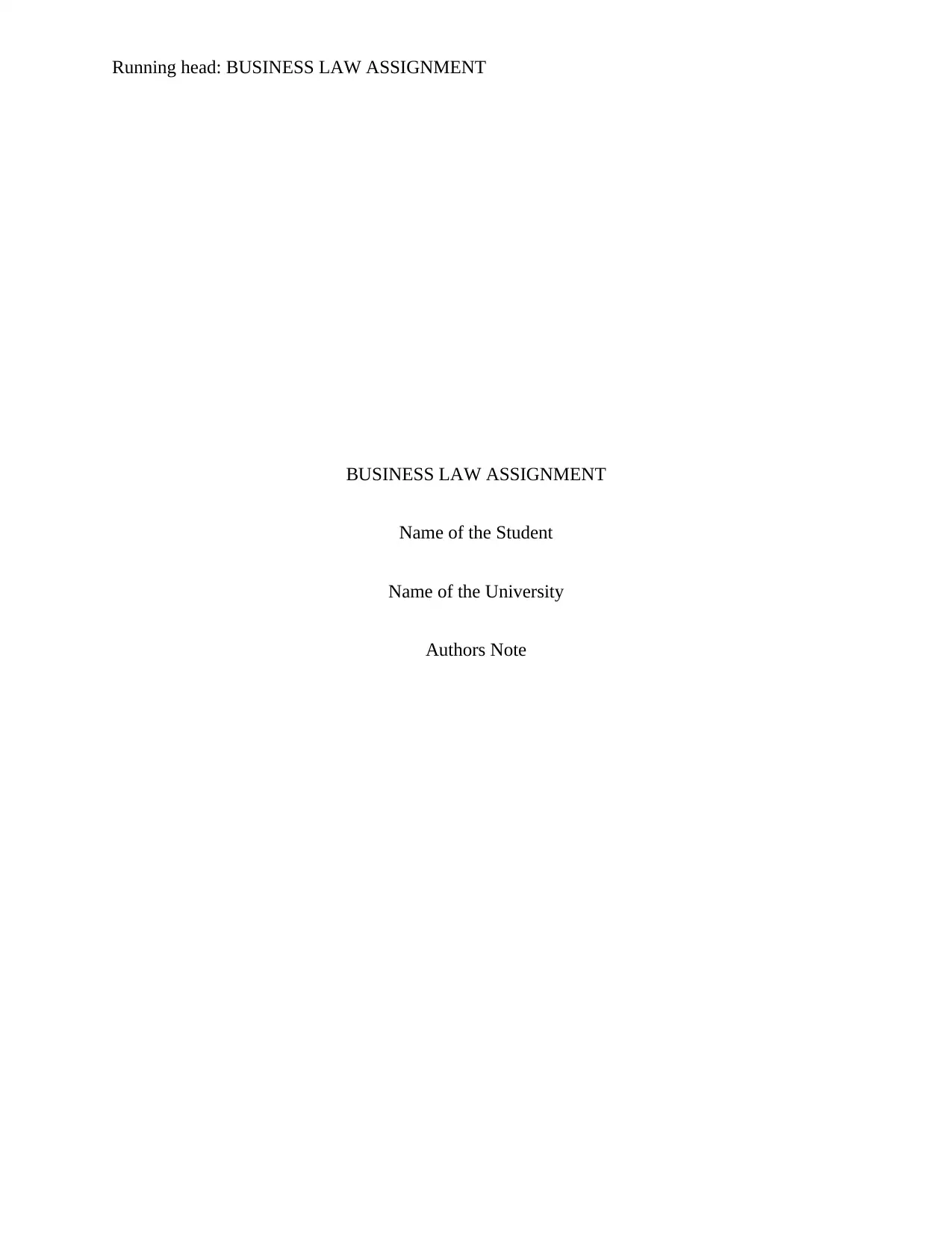
Running head: BUSINESS LAW ASSIGNMENT
BUSINESS LAW ASSIGNMENT
Name of the Student
Name of the University
Authors Note
BUSINESS LAW ASSIGNMENT
Name of the Student
Name of the University
Authors Note
Paraphrase This Document
Need a fresh take? Get an instant paraphrase of this document with our AI Paraphraser
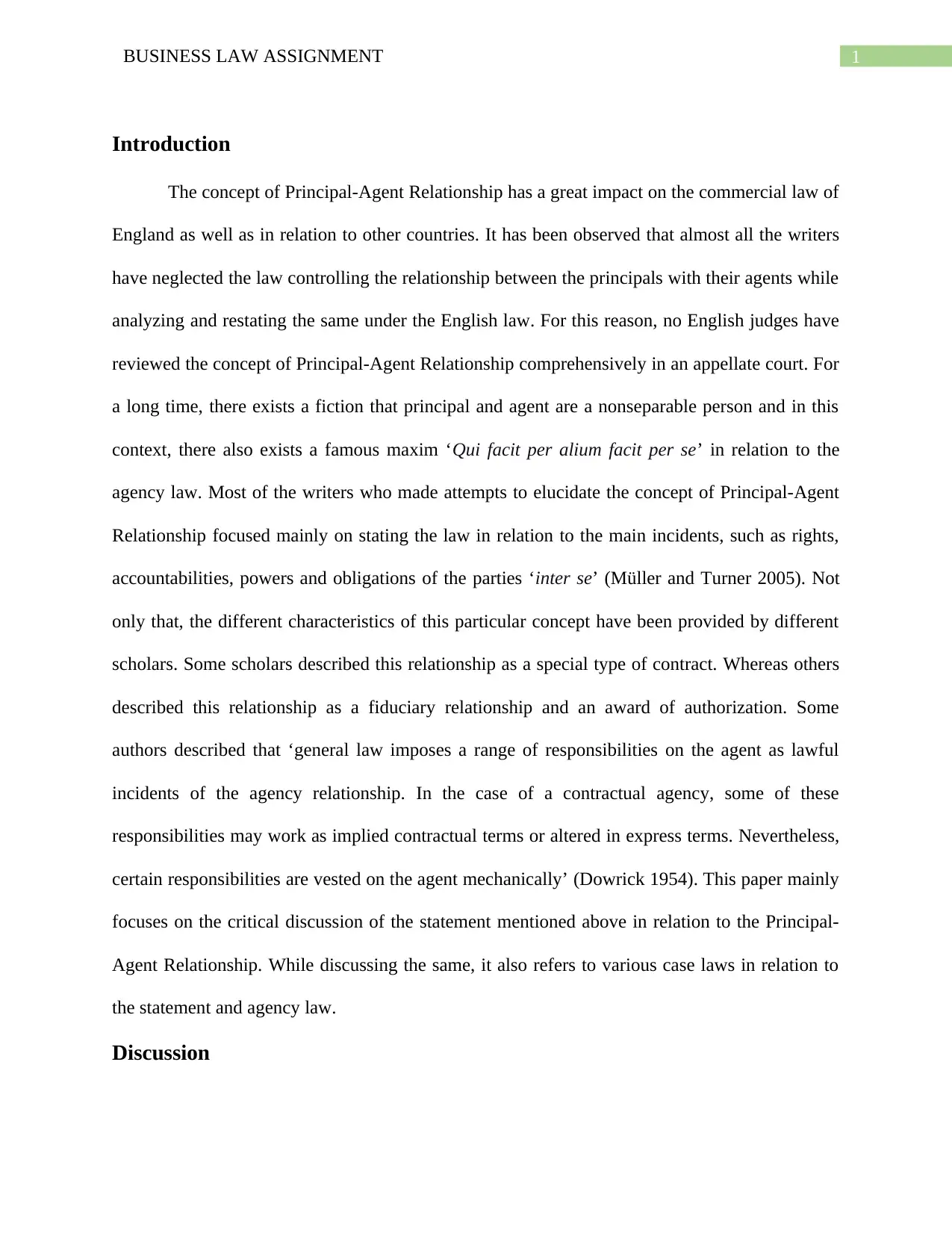
1BUSINESS LAW ASSIGNMENT
Introduction
The concept of Principal-Agent Relationship has a great impact on the commercial law of
England as well as in relation to other countries. It has been observed that almost all the writers
have neglected the law controlling the relationship between the principals with their agents while
analyzing and restating the same under the English law. For this reason, no English judges have
reviewed the concept of Principal-Agent Relationship comprehensively in an appellate court. For
a long time, there exists a fiction that principal and agent are a nonseparable person and in this
context, there also exists a famous maxim ‘Qui facit per alium facit per se’ in relation to the
agency law. Most of the writers who made attempts to elucidate the concept of Principal-Agent
Relationship focused mainly on stating the law in relation to the main incidents, such as rights,
accountabilities, powers and obligations of the parties ‘inter se’ (Müller and Turner 2005). Not
only that, the different characteristics of this particular concept have been provided by different
scholars. Some scholars described this relationship as a special type of contract. Whereas others
described this relationship as a fiduciary relationship and an award of authorization. Some
authors described that ‘general law imposes a range of responsibilities on the agent as lawful
incidents of the agency relationship. In the case of a contractual agency, some of these
responsibilities may work as implied contractual terms or altered in express terms. Nevertheless,
certain responsibilities are vested on the agent mechanically’ (Dowrick 1954). This paper mainly
focuses on the critical discussion of the statement mentioned above in relation to the Principal-
Agent Relationship. While discussing the same, it also refers to various case laws in relation to
the statement and agency law.
Discussion
Introduction
The concept of Principal-Agent Relationship has a great impact on the commercial law of
England as well as in relation to other countries. It has been observed that almost all the writers
have neglected the law controlling the relationship between the principals with their agents while
analyzing and restating the same under the English law. For this reason, no English judges have
reviewed the concept of Principal-Agent Relationship comprehensively in an appellate court. For
a long time, there exists a fiction that principal and agent are a nonseparable person and in this
context, there also exists a famous maxim ‘Qui facit per alium facit per se’ in relation to the
agency law. Most of the writers who made attempts to elucidate the concept of Principal-Agent
Relationship focused mainly on stating the law in relation to the main incidents, such as rights,
accountabilities, powers and obligations of the parties ‘inter se’ (Müller and Turner 2005). Not
only that, the different characteristics of this particular concept have been provided by different
scholars. Some scholars described this relationship as a special type of contract. Whereas others
described this relationship as a fiduciary relationship and an award of authorization. Some
authors described that ‘general law imposes a range of responsibilities on the agent as lawful
incidents of the agency relationship. In the case of a contractual agency, some of these
responsibilities may work as implied contractual terms or altered in express terms. Nevertheless,
certain responsibilities are vested on the agent mechanically’ (Dowrick 1954). This paper mainly
focuses on the critical discussion of the statement mentioned above in relation to the Principal-
Agent Relationship. While discussing the same, it also refers to various case laws in relation to
the statement and agency law.
Discussion
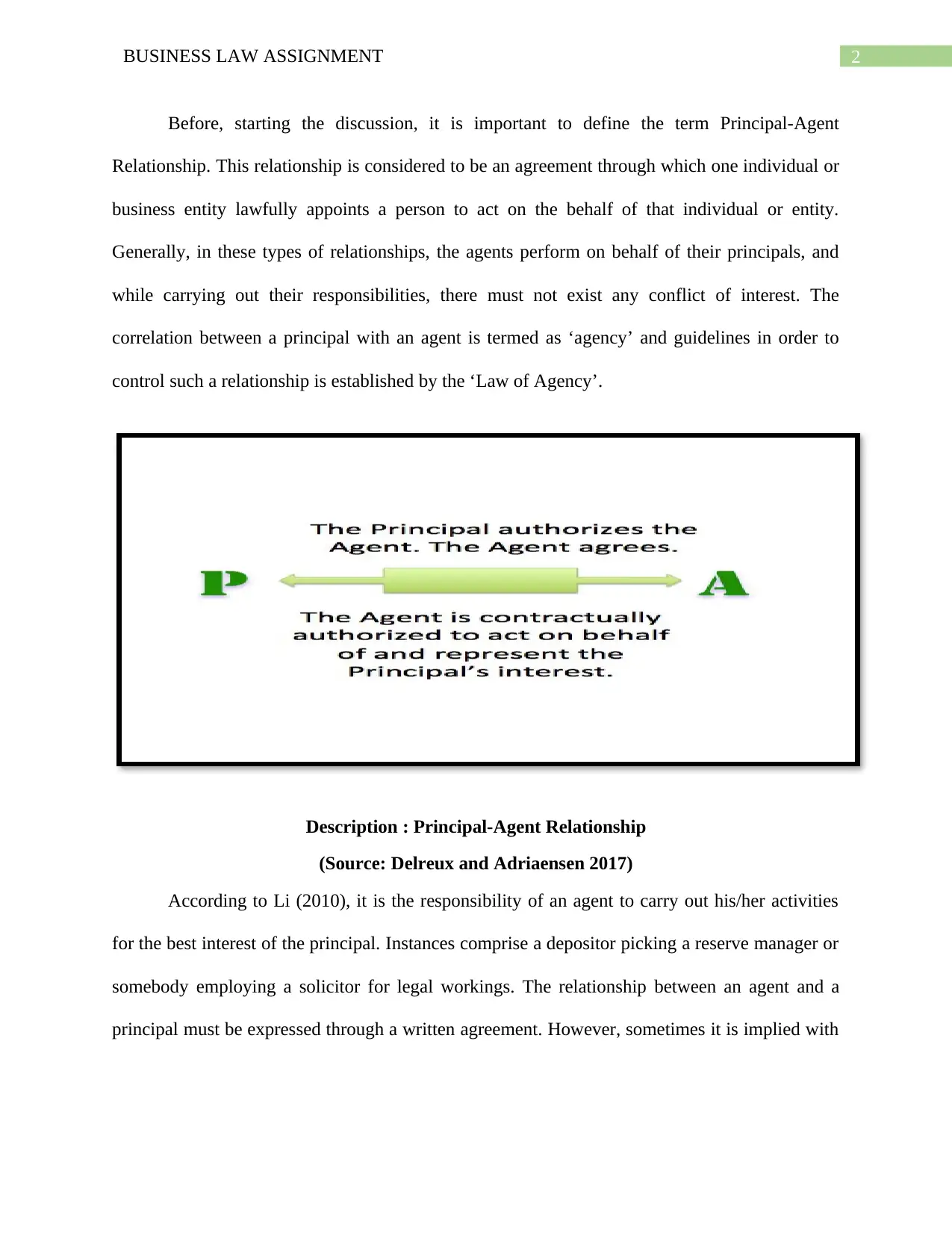
2BUSINESS LAW ASSIGNMENT
Before, starting the discussion, it is important to define the term Principal-Agent
Relationship. This relationship is considered to be an agreement through which one individual or
business entity lawfully appoints a person to act on the behalf of that individual or entity.
Generally, in these types of relationships, the agents perform on behalf of their principals, and
while carrying out their responsibilities, there must not exist any conflict of interest. The
correlation between a principal with an agent is termed as ‘agency’ and guidelines in order to
control such a relationship is established by the ‘Law of Agency’.
Description : Principal-Agent Relationship
(Source: Delreux and Adriaensen 2017)
According to Li (2010), it is the responsibility of an agent to carry out his/her activities
for the best interest of the principal. Instances comprise a depositor picking a reserve manager or
somebody employing a solicitor for legal workings. The relationship between an agent and a
principal must be expressed through a written agreement. However, sometimes it is implied with
Before, starting the discussion, it is important to define the term Principal-Agent
Relationship. This relationship is considered to be an agreement through which one individual or
business entity lawfully appoints a person to act on the behalf of that individual or entity.
Generally, in these types of relationships, the agents perform on behalf of their principals, and
while carrying out their responsibilities, there must not exist any conflict of interest. The
correlation between a principal with an agent is termed as ‘agency’ and guidelines in order to
control such a relationship is established by the ‘Law of Agency’.
Description : Principal-Agent Relationship
(Source: Delreux and Adriaensen 2017)
According to Li (2010), it is the responsibility of an agent to carry out his/her activities
for the best interest of the principal. Instances comprise a depositor picking a reserve manager or
somebody employing a solicitor for legal workings. The relationship between an agent and a
principal must be expressed through a written agreement. However, sometimes it is implied with
⊘ This is a preview!⊘
Do you want full access?
Subscribe today to unlock all pages.

Trusted by 1+ million students worldwide
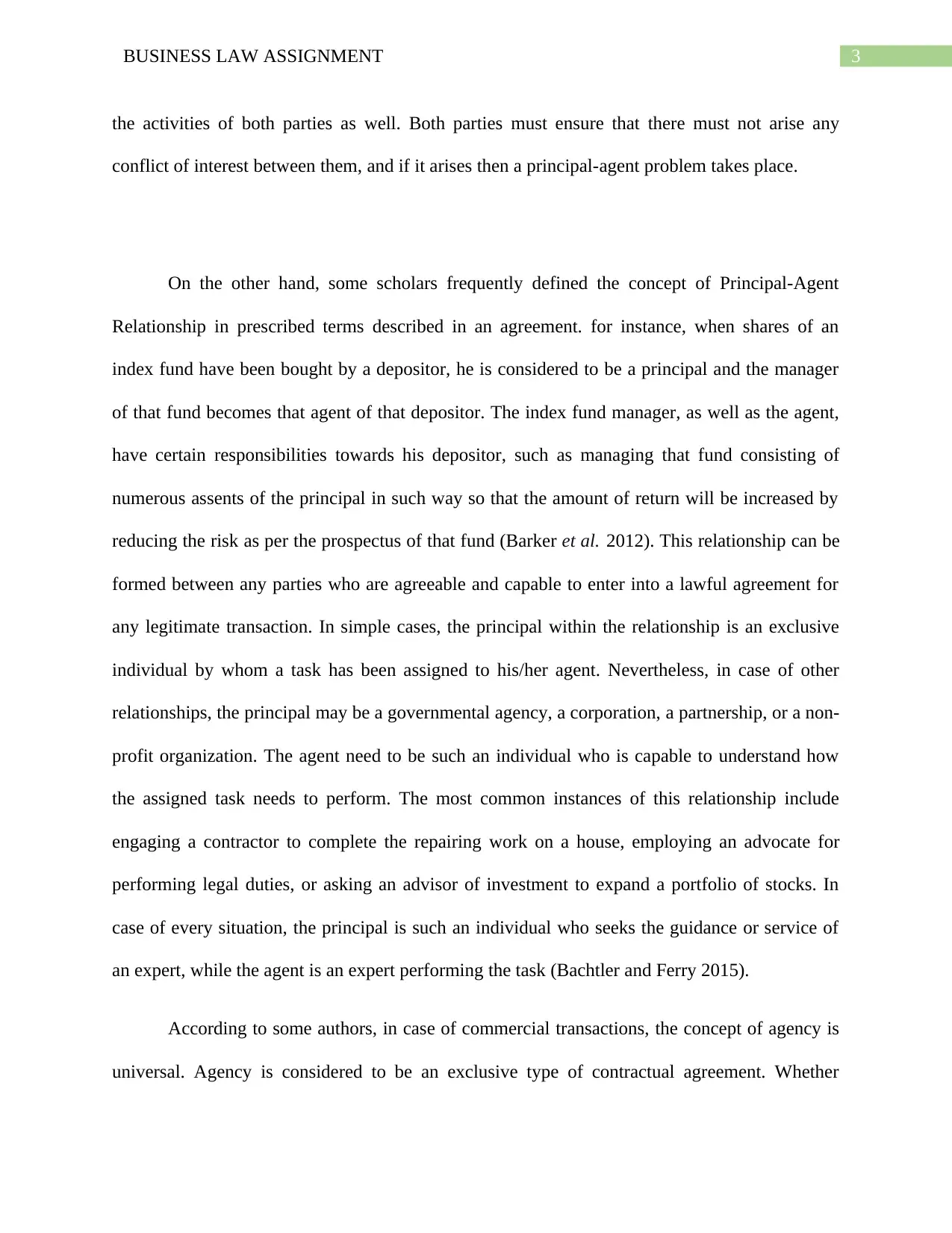
3BUSINESS LAW ASSIGNMENT
the activities of both parties as well. Both parties must ensure that there must not arise any
conflict of interest between them, and if it arises then a principal-agent problem takes place.
On the other hand, some scholars frequently defined the concept of Principal-Agent
Relationship in prescribed terms described in an agreement. for instance, when shares of an
index fund have been bought by a depositor, he is considered to be a principal and the manager
of that fund becomes that agent of that depositor. The index fund manager, as well as the agent,
have certain responsibilities towards his depositor, such as managing that fund consisting of
numerous assents of the principal in such way so that the amount of return will be increased by
reducing the risk as per the prospectus of that fund (Barker et al. 2012). This relationship can be
formed between any parties who are agreeable and capable to enter into a lawful agreement for
any legitimate transaction. In simple cases, the principal within the relationship is an exclusive
individual by whom a task has been assigned to his/her agent. Nevertheless, in case of other
relationships, the principal may be a governmental agency, a corporation, a partnership, or a non-
profit organization. The agent need to be such an individual who is capable to understand how
the assigned task needs to perform. The most common instances of this relationship include
engaging a contractor to complete the repairing work on a house, employing an advocate for
performing legal duties, or asking an advisor of investment to expand a portfolio of stocks. In
case of every situation, the principal is such an individual who seeks the guidance or service of
an expert, while the agent is an expert performing the task (Bachtler and Ferry 2015).
According to some authors, in case of commercial transactions, the concept of agency is
universal. Agency is considered to be an exclusive type of contractual agreement. Whether
the activities of both parties as well. Both parties must ensure that there must not arise any
conflict of interest between them, and if it arises then a principal-agent problem takes place.
On the other hand, some scholars frequently defined the concept of Principal-Agent
Relationship in prescribed terms described in an agreement. for instance, when shares of an
index fund have been bought by a depositor, he is considered to be a principal and the manager
of that fund becomes that agent of that depositor. The index fund manager, as well as the agent,
have certain responsibilities towards his depositor, such as managing that fund consisting of
numerous assents of the principal in such way so that the amount of return will be increased by
reducing the risk as per the prospectus of that fund (Barker et al. 2012). This relationship can be
formed between any parties who are agreeable and capable to enter into a lawful agreement for
any legitimate transaction. In simple cases, the principal within the relationship is an exclusive
individual by whom a task has been assigned to his/her agent. Nevertheless, in case of other
relationships, the principal may be a governmental agency, a corporation, a partnership, or a non-
profit organization. The agent need to be such an individual who is capable to understand how
the assigned task needs to perform. The most common instances of this relationship include
engaging a contractor to complete the repairing work on a house, employing an advocate for
performing legal duties, or asking an advisor of investment to expand a portfolio of stocks. In
case of every situation, the principal is such an individual who seeks the guidance or service of
an expert, while the agent is an expert performing the task (Bachtler and Ferry 2015).
According to some authors, in case of commercial transactions, the concept of agency is
universal. Agency is considered to be an exclusive type of contractual agreement. Whether
Paraphrase This Document
Need a fresh take? Get an instant paraphrase of this document with our AI Paraphraser
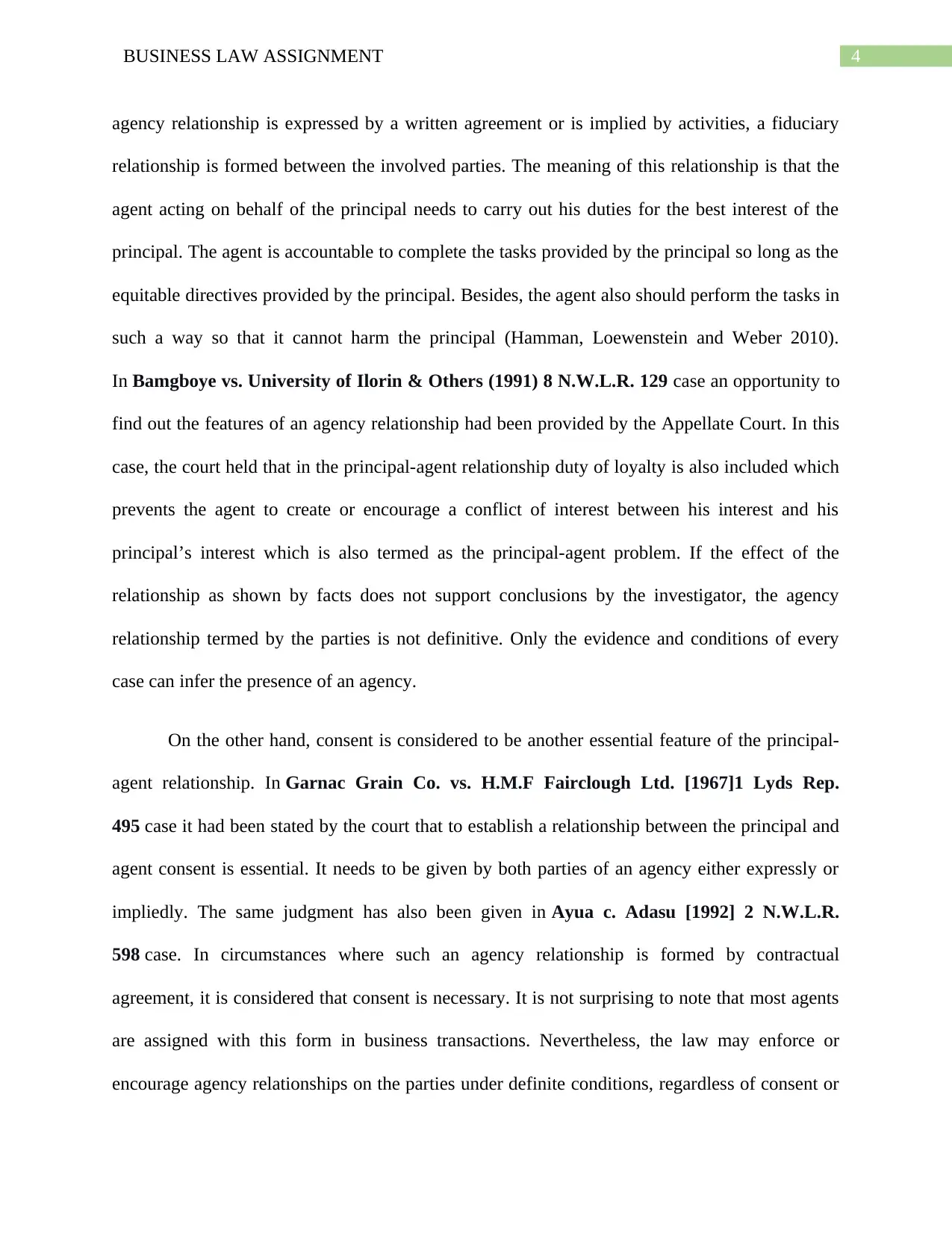
4BUSINESS LAW ASSIGNMENT
agency relationship is expressed by a written agreement or is implied by activities, a fiduciary
relationship is formed between the involved parties. The meaning of this relationship is that the
agent acting on behalf of the principal needs to carry out his duties for the best interest of the
principal. The agent is accountable to complete the tasks provided by the principal so long as the
equitable directives provided by the principal. Besides, the agent also should perform the tasks in
such a way so that it cannot harm the principal (Hamman, Loewenstein and Weber 2010).
In Bamgboye vs. University of Ilorin & Others (1991) 8 N.W.L.R. 129 case an opportunity to
find out the features of an agency relationship had been provided by the Appellate Court. In this
case, the court held that in the principal-agent relationship duty of loyalty is also included which
prevents the agent to create or encourage a conflict of interest between his interest and his
principal’s interest which is also termed as the principal-agent problem. If the effect of the
relationship as shown by facts does not support conclusions by the investigator, the agency
relationship termed by the parties is not definitive. Only the evidence and conditions of every
case can infer the presence of an agency.
On the other hand, consent is considered to be another essential feature of the principal-
agent relationship. In Garnac Grain Co. vs. H.M.F Fairclough Ltd. [1967]1 Lyds Rep.
495 case it had been stated by the court that to establish a relationship between the principal and
agent consent is essential. It needs to be given by both parties of an agency either expressly or
impliedly. The same judgment has also been given in Ayua c. Adasu [1992] 2 N.W.L.R.
598 case. In circumstances where such an agency relationship is formed by contractual
agreement, it is considered that consent is necessary. It is not surprising to note that most agents
are assigned with this form in business transactions. Nevertheless, the law may enforce or
encourage agency relationships on the parties under definite conditions, regardless of consent or
agency relationship is expressed by a written agreement or is implied by activities, a fiduciary
relationship is formed between the involved parties. The meaning of this relationship is that the
agent acting on behalf of the principal needs to carry out his duties for the best interest of the
principal. The agent is accountable to complete the tasks provided by the principal so long as the
equitable directives provided by the principal. Besides, the agent also should perform the tasks in
such a way so that it cannot harm the principal (Hamman, Loewenstein and Weber 2010).
In Bamgboye vs. University of Ilorin & Others (1991) 8 N.W.L.R. 129 case an opportunity to
find out the features of an agency relationship had been provided by the Appellate Court. In this
case, the court held that in the principal-agent relationship duty of loyalty is also included which
prevents the agent to create or encourage a conflict of interest between his interest and his
principal’s interest which is also termed as the principal-agent problem. If the effect of the
relationship as shown by facts does not support conclusions by the investigator, the agency
relationship termed by the parties is not definitive. Only the evidence and conditions of every
case can infer the presence of an agency.
On the other hand, consent is considered to be another essential feature of the principal-
agent relationship. In Garnac Grain Co. vs. H.M.F Fairclough Ltd. [1967]1 Lyds Rep.
495 case it had been stated by the court that to establish a relationship between the principal and
agent consent is essential. It needs to be given by both parties of an agency either expressly or
impliedly. The same judgment has also been given in Ayua c. Adasu [1992] 2 N.W.L.R.
598 case. In circumstances where such an agency relationship is formed by contractual
agreement, it is considered that consent is necessary. It is not surprising to note that most agents
are assigned with this form in business transactions. Nevertheless, the law may enforce or
encourage agency relationships on the parties under definite conditions, regardless of consent or
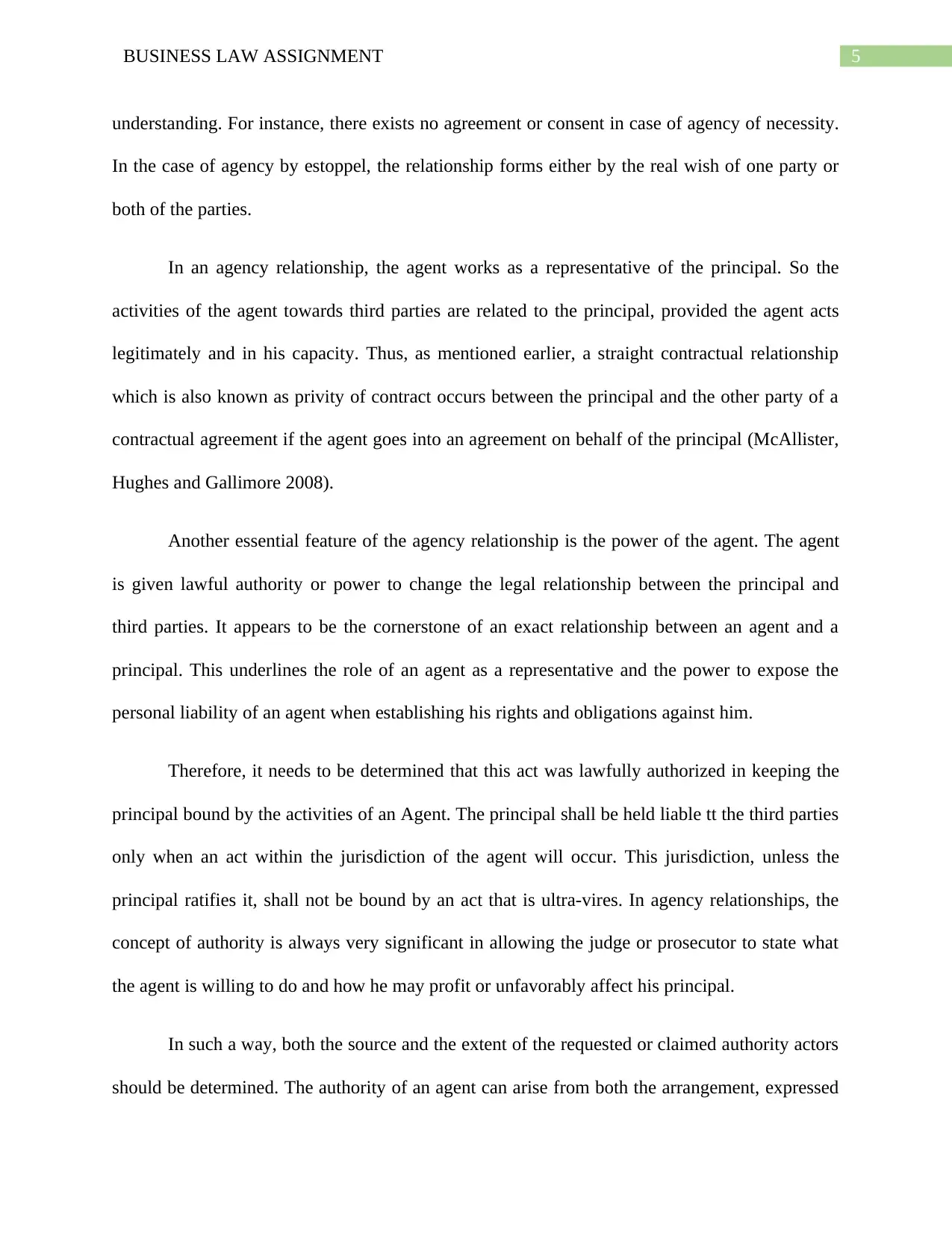
5BUSINESS LAW ASSIGNMENT
understanding. For instance, there exists no agreement or consent in case of agency of necessity.
In the case of agency by estoppel, the relationship forms either by the real wish of one party or
both of the parties.
In an agency relationship, the agent works as a representative of the principal. So the
activities of the agent towards third parties are related to the principal, provided the agent acts
legitimately and in his capacity. Thus, as mentioned earlier, a straight contractual relationship
which is also known as privity of contract occurs between the principal and the other party of a
contractual agreement if the agent goes into an agreement on behalf of the principal (McAllister,
Hughes and Gallimore 2008).
Another essential feature of the agency relationship is the power of the agent. The agent
is given lawful authority or power to change the legal relationship between the principal and
third parties. It appears to be the cornerstone of an exact relationship between an agent and a
principal. This underlines the role of an agent as a representative and the power to expose the
personal liability of an agent when establishing his rights and obligations against him.
Therefore, it needs to be determined that this act was lawfully authorized in keeping the
principal bound by the activities of an Agent. The principal shall be held liable tt the third parties
only when an act within the jurisdiction of the agent will occur. This jurisdiction, unless the
principal ratifies it, shall not be bound by an act that is ultra-vires. In agency relationships, the
concept of authority is always very significant in allowing the judge or prosecutor to state what
the agent is willing to do and how he may profit or unfavorably affect his principal.
In such a way, both the source and the extent of the requested or claimed authority actors
should be determined. The authority of an agent can arise from both the arrangement, expressed
understanding. For instance, there exists no agreement or consent in case of agency of necessity.
In the case of agency by estoppel, the relationship forms either by the real wish of one party or
both of the parties.
In an agency relationship, the agent works as a representative of the principal. So the
activities of the agent towards third parties are related to the principal, provided the agent acts
legitimately and in his capacity. Thus, as mentioned earlier, a straight contractual relationship
which is also known as privity of contract occurs between the principal and the other party of a
contractual agreement if the agent goes into an agreement on behalf of the principal (McAllister,
Hughes and Gallimore 2008).
Another essential feature of the agency relationship is the power of the agent. The agent
is given lawful authority or power to change the legal relationship between the principal and
third parties. It appears to be the cornerstone of an exact relationship between an agent and a
principal. This underlines the role of an agent as a representative and the power to expose the
personal liability of an agent when establishing his rights and obligations against him.
Therefore, it needs to be determined that this act was lawfully authorized in keeping the
principal bound by the activities of an Agent. The principal shall be held liable tt the third parties
only when an act within the jurisdiction of the agent will occur. This jurisdiction, unless the
principal ratifies it, shall not be bound by an act that is ultra-vires. In agency relationships, the
concept of authority is always very significant in allowing the judge or prosecutor to state what
the agent is willing to do and how he may profit or unfavorably affect his principal.
In such a way, both the source and the extent of the requested or claimed authority actors
should be determined. The authority of an agent can arise from both the arrangement, expressed
⊘ This is a preview!⊘
Do you want full access?
Subscribe today to unlock all pages.

Trusted by 1+ million students worldwide
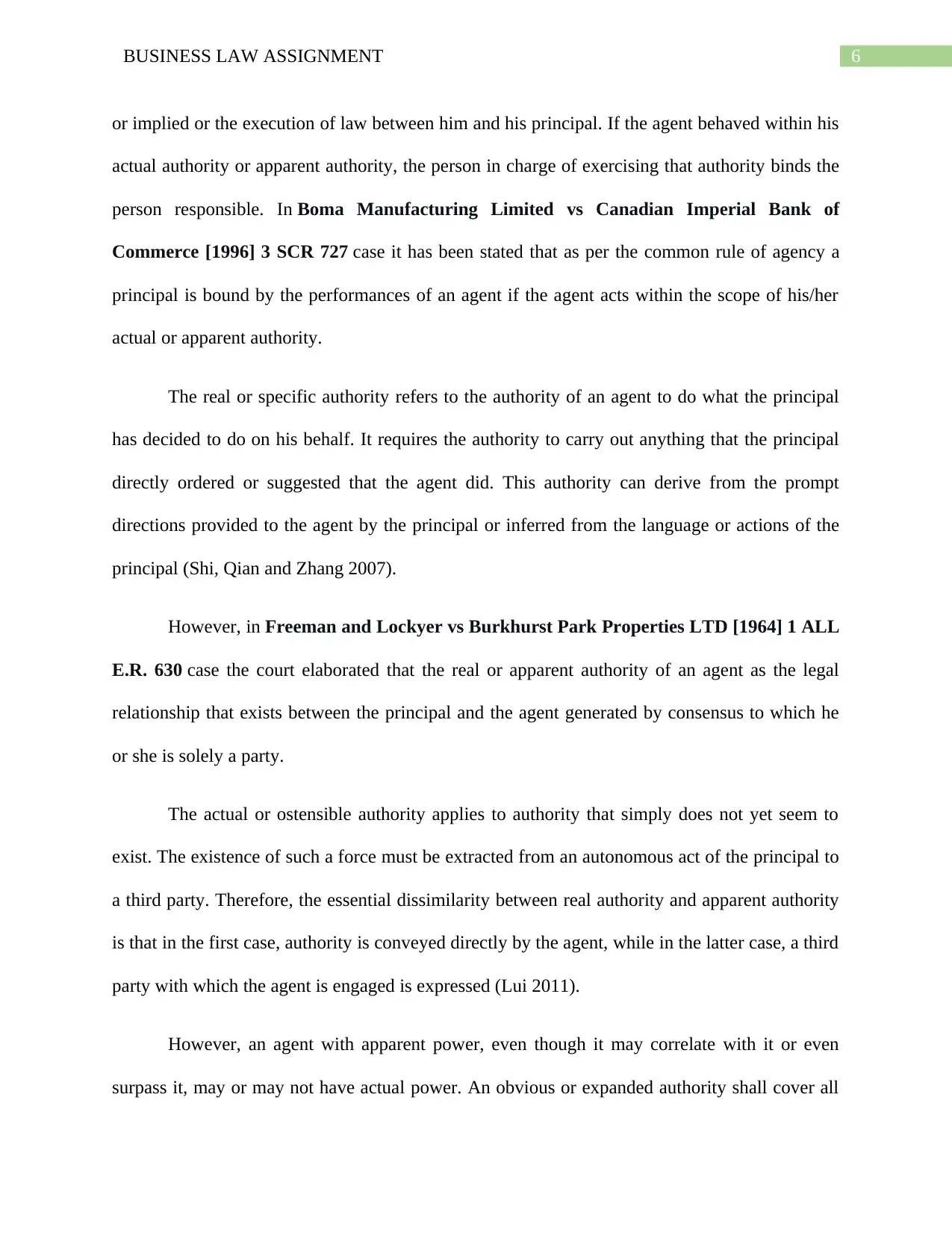
6BUSINESS LAW ASSIGNMENT
or implied or the execution of law between him and his principal. If the agent behaved within his
actual authority or apparent authority, the person in charge of exercising that authority binds the
person responsible. In Boma Manufacturing Limited vs Canadian Imperial Bank of
Commerce [1996] 3 SCR 727 case it has been stated that as per the common rule of agency a
principal is bound by the performances of an agent if the agent acts within the scope of his/her
actual or apparent authority.
The real or specific authority refers to the authority of an agent to do what the principal
has decided to do on his behalf. It requires the authority to carry out anything that the principal
directly ordered or suggested that the agent did. This authority can derive from the prompt
directions provided to the agent by the principal or inferred from the language or actions of the
principal (Shi, Qian and Zhang 2007).
However, in Freeman and Lockyer vs Burkhurst Park Properties LTD [1964] 1 ALL
E.R. 630 case the court elaborated that the real or apparent authority of an agent as the legal
relationship that exists between the principal and the agent generated by consensus to which he
or she is solely a party.
The actual or ostensible authority applies to authority that simply does not yet seem to
exist. The existence of such a force must be extracted from an autonomous act of the principal to
a third party. Therefore, the essential dissimilarity between real authority and apparent authority
is that in the first case, authority is conveyed directly by the agent, while in the latter case, a third
party with which the agent is engaged is expressed (Lui 2011).
However, an agent with apparent power, even though it may correlate with it or even
surpass it, may or may not have actual power. An obvious or expanded authority shall cover all
or implied or the execution of law between him and his principal. If the agent behaved within his
actual authority or apparent authority, the person in charge of exercising that authority binds the
person responsible. In Boma Manufacturing Limited vs Canadian Imperial Bank of
Commerce [1996] 3 SCR 727 case it has been stated that as per the common rule of agency a
principal is bound by the performances of an agent if the agent acts within the scope of his/her
actual or apparent authority.
The real or specific authority refers to the authority of an agent to do what the principal
has decided to do on his behalf. It requires the authority to carry out anything that the principal
directly ordered or suggested that the agent did. This authority can derive from the prompt
directions provided to the agent by the principal or inferred from the language or actions of the
principal (Shi, Qian and Zhang 2007).
However, in Freeman and Lockyer vs Burkhurst Park Properties LTD [1964] 1 ALL
E.R. 630 case the court elaborated that the real or apparent authority of an agent as the legal
relationship that exists between the principal and the agent generated by consensus to which he
or she is solely a party.
The actual or ostensible authority applies to authority that simply does not yet seem to
exist. The existence of such a force must be extracted from an autonomous act of the principal to
a third party. Therefore, the essential dissimilarity between real authority and apparent authority
is that in the first case, authority is conveyed directly by the agent, while in the latter case, a third
party with which the agent is engaged is expressed (Lui 2011).
However, an agent with apparent power, even though it may correlate with it or even
surpass it, may or may not have actual power. An obvious or expanded authority shall cover all
Paraphrase This Document
Need a fresh take? Get an instant paraphrase of this document with our AI Paraphraser
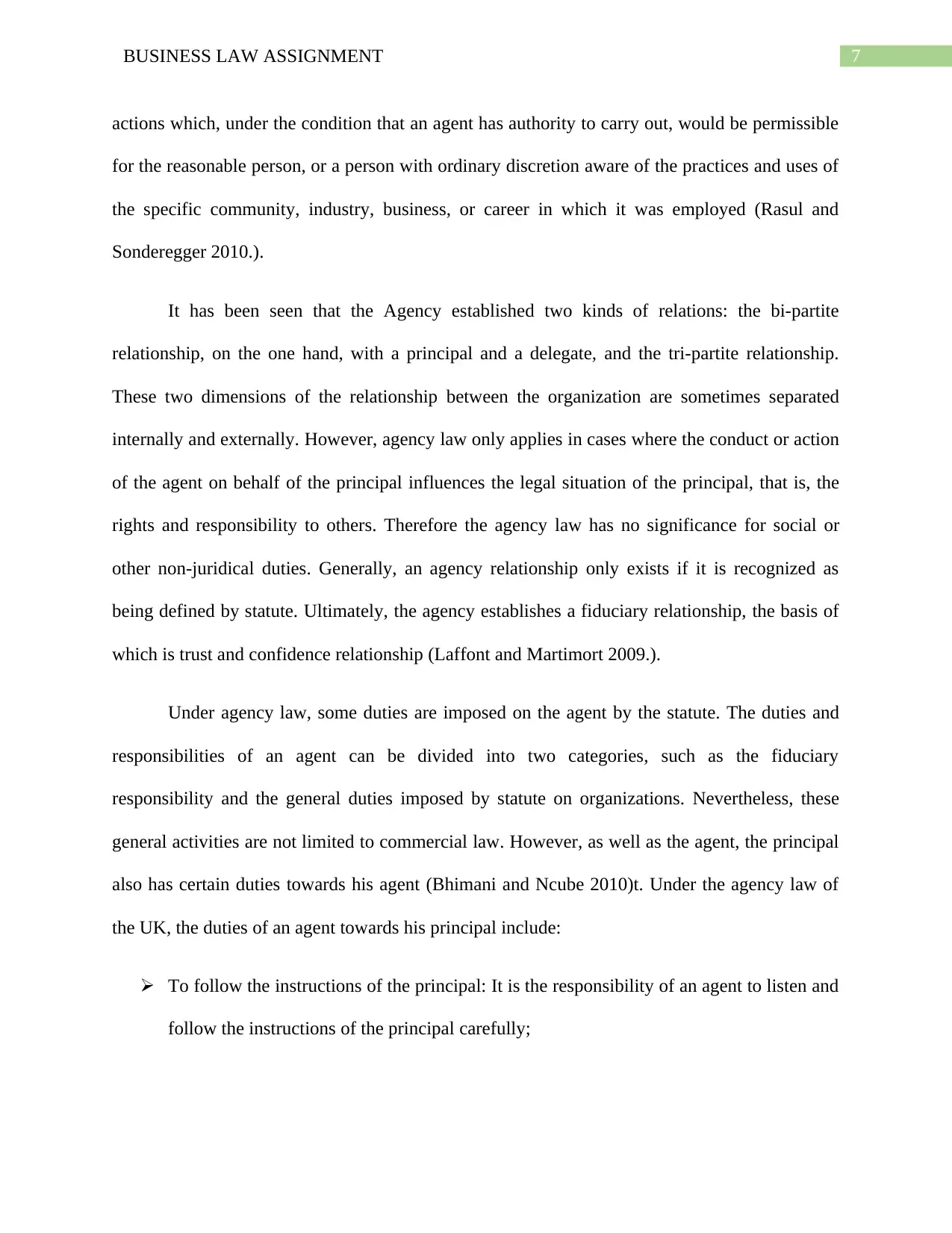
7BUSINESS LAW ASSIGNMENT
actions which, under the condition that an agent has authority to carry out, would be permissible
for the reasonable person, or a person with ordinary discretion aware of the practices and uses of
the specific community, industry, business, or career in which it was employed (Rasul and
Sonderegger 2010.).
It has been seen that the Agency established two kinds of relations: the bi-partite
relationship, on the one hand, with a principal and a delegate, and the tri-partite relationship.
These two dimensions of the relationship between the organization are sometimes separated
internally and externally. However, agency law only applies in cases where the conduct or action
of the agent on behalf of the principal influences the legal situation of the principal, that is, the
rights and responsibility to others. Therefore the agency law has no significance for social or
other non-juridical duties. Generally, an agency relationship only exists if it is recognized as
being defined by statute. Ultimately, the agency establishes a fiduciary relationship, the basis of
which is trust and confidence relationship (Laffont and Martimort 2009.).
Under agency law, some duties are imposed on the agent by the statute. The duties and
responsibilities of an agent can be divided into two categories, such as the fiduciary
responsibility and the general duties imposed by statute on organizations. Nevertheless, these
general activities are not limited to commercial law. However, as well as the agent, the principal
also has certain duties towards his agent (Bhimani and Ncube 2010)t. Under the agency law of
the UK, the duties of an agent towards his principal include:
To follow the instructions of the principal: It is the responsibility of an agent to listen and
follow the instructions of the principal carefully;
actions which, under the condition that an agent has authority to carry out, would be permissible
for the reasonable person, or a person with ordinary discretion aware of the practices and uses of
the specific community, industry, business, or career in which it was employed (Rasul and
Sonderegger 2010.).
It has been seen that the Agency established two kinds of relations: the bi-partite
relationship, on the one hand, with a principal and a delegate, and the tri-partite relationship.
These two dimensions of the relationship between the organization are sometimes separated
internally and externally. However, agency law only applies in cases where the conduct or action
of the agent on behalf of the principal influences the legal situation of the principal, that is, the
rights and responsibility to others. Therefore the agency law has no significance for social or
other non-juridical duties. Generally, an agency relationship only exists if it is recognized as
being defined by statute. Ultimately, the agency establishes a fiduciary relationship, the basis of
which is trust and confidence relationship (Laffont and Martimort 2009.).
Under agency law, some duties are imposed on the agent by the statute. The duties and
responsibilities of an agent can be divided into two categories, such as the fiduciary
responsibility and the general duties imposed by statute on organizations. Nevertheless, these
general activities are not limited to commercial law. However, as well as the agent, the principal
also has certain duties towards his agent (Bhimani and Ncube 2010)t. Under the agency law of
the UK, the duties of an agent towards his principal include:
To follow the instructions of the principal: It is the responsibility of an agent to listen and
follow the instructions of the principal carefully;
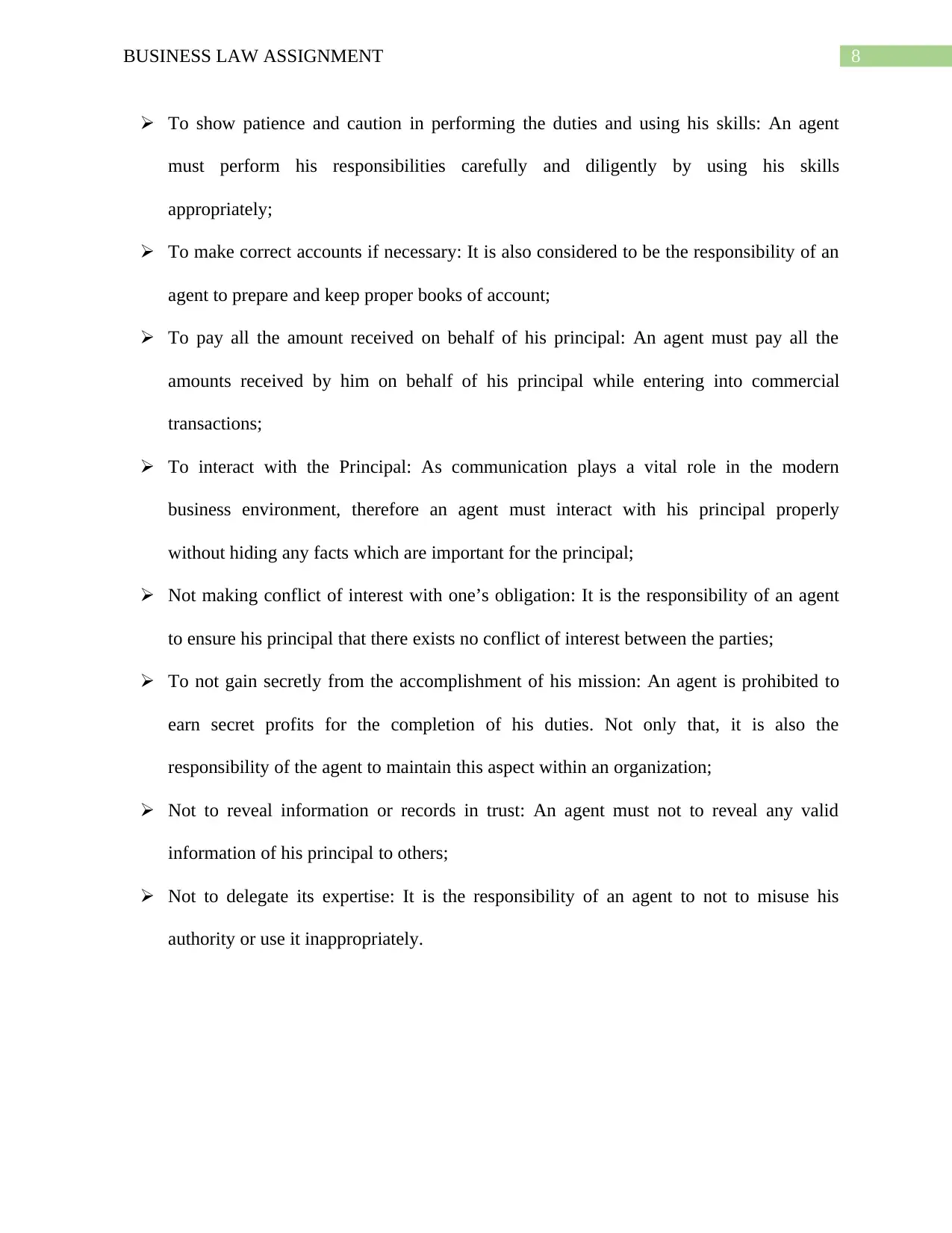
8BUSINESS LAW ASSIGNMENT
To show patience and caution in performing the duties and using his skills: An agent
must perform his responsibilities carefully and diligently by using his skills
appropriately;
To make correct accounts if necessary: It is also considered to be the responsibility of an
agent to prepare and keep proper books of account;
To pay all the amount received on behalf of his principal: An agent must pay all the
amounts received by him on behalf of his principal while entering into commercial
transactions;
To interact with the Principal: As communication plays a vital role in the modern
business environment, therefore an agent must interact with his principal properly
without hiding any facts which are important for the principal;
Not making conflict of interest with one’s obligation: It is the responsibility of an agent
to ensure his principal that there exists no conflict of interest between the parties;
To not gain secretly from the accomplishment of his mission: An agent is prohibited to
earn secret profits for the completion of his duties. Not only that, it is also the
responsibility of the agent to maintain this aspect within an organization;
Not to reveal information or records in trust: An agent must not to reveal any valid
information of his principal to others;
Not to delegate its expertise: It is the responsibility of an agent to not to misuse his
authority or use it inappropriately.
To show patience and caution in performing the duties and using his skills: An agent
must perform his responsibilities carefully and diligently by using his skills
appropriately;
To make correct accounts if necessary: It is also considered to be the responsibility of an
agent to prepare and keep proper books of account;
To pay all the amount received on behalf of his principal: An agent must pay all the
amounts received by him on behalf of his principal while entering into commercial
transactions;
To interact with the Principal: As communication plays a vital role in the modern
business environment, therefore an agent must interact with his principal properly
without hiding any facts which are important for the principal;
Not making conflict of interest with one’s obligation: It is the responsibility of an agent
to ensure his principal that there exists no conflict of interest between the parties;
To not gain secretly from the accomplishment of his mission: An agent is prohibited to
earn secret profits for the completion of his duties. Not only that, it is also the
responsibility of the agent to maintain this aspect within an organization;
Not to reveal information or records in trust: An agent must not to reveal any valid
information of his principal to others;
Not to delegate its expertise: It is the responsibility of an agent to not to misuse his
authority or use it inappropriately.
⊘ This is a preview!⊘
Do you want full access?
Subscribe today to unlock all pages.

Trusted by 1+ million students worldwide
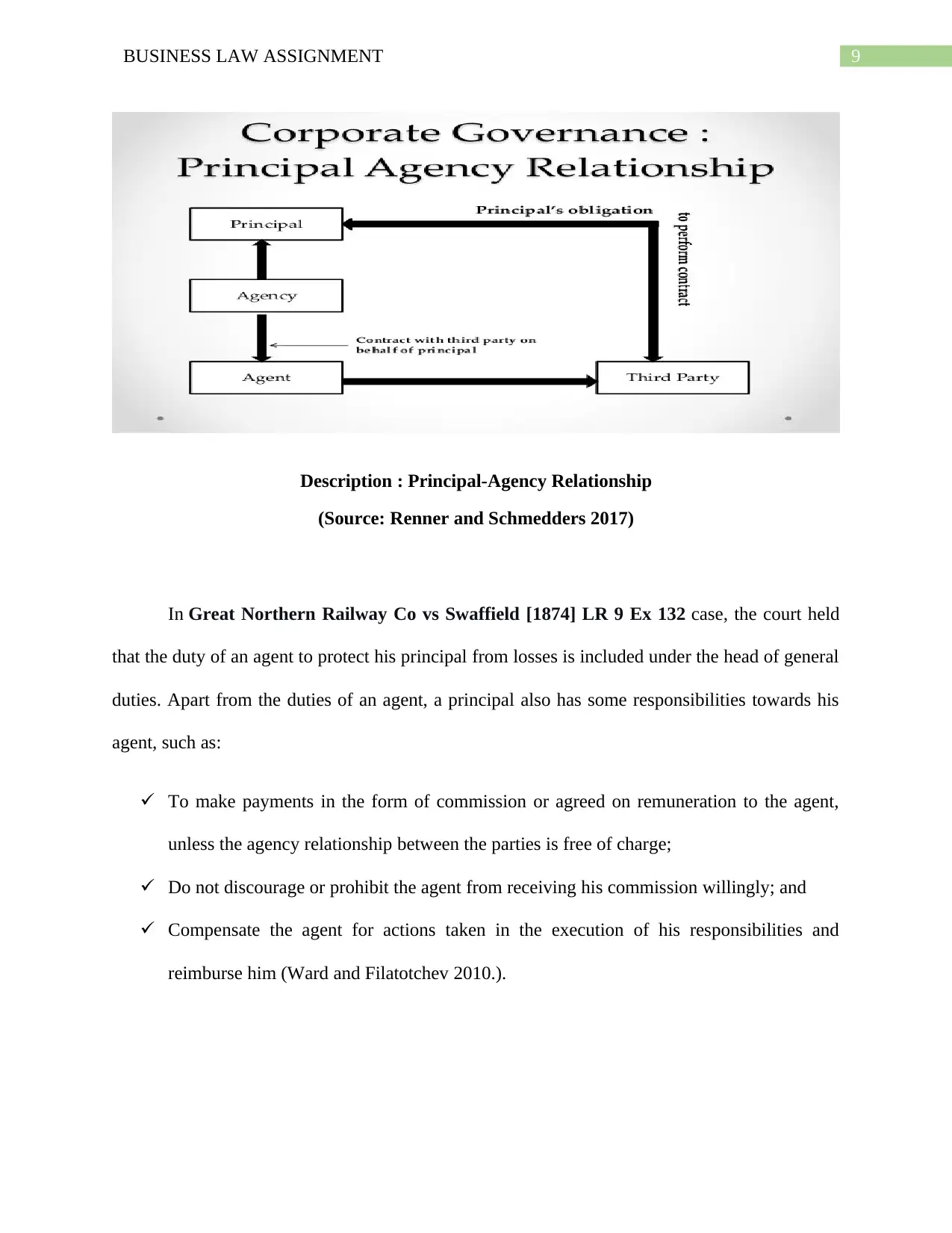
9BUSINESS LAW ASSIGNMENT
Description : Principal-Agency Relationship
(Source: Renner and Schmedders 2017)
In Great Northern Railway Co vs Swaffield [1874] LR 9 Ex 132 case, the court held
that the duty of an agent to protect his principal from losses is included under the head of general
duties. Apart from the duties of an agent, a principal also has some responsibilities towards his
agent, such as:
To make payments in the form of commission or agreed on remuneration to the agent,
unless the agency relationship between the parties is free of charge;
Do not discourage or prohibit the agent from receiving his commission willingly; and
Compensate the agent for actions taken in the execution of his responsibilities and
reimburse him (Ward and Filatotchev 2010.).
Description : Principal-Agency Relationship
(Source: Renner and Schmedders 2017)
In Great Northern Railway Co vs Swaffield [1874] LR 9 Ex 132 case, the court held
that the duty of an agent to protect his principal from losses is included under the head of general
duties. Apart from the duties of an agent, a principal also has some responsibilities towards his
agent, such as:
To make payments in the form of commission or agreed on remuneration to the agent,
unless the agency relationship between the parties is free of charge;
Do not discourage or prohibit the agent from receiving his commission willingly; and
Compensate the agent for actions taken in the execution of his responsibilities and
reimburse him (Ward and Filatotchev 2010.).
Paraphrase This Document
Need a fresh take? Get an instant paraphrase of this document with our AI Paraphraser
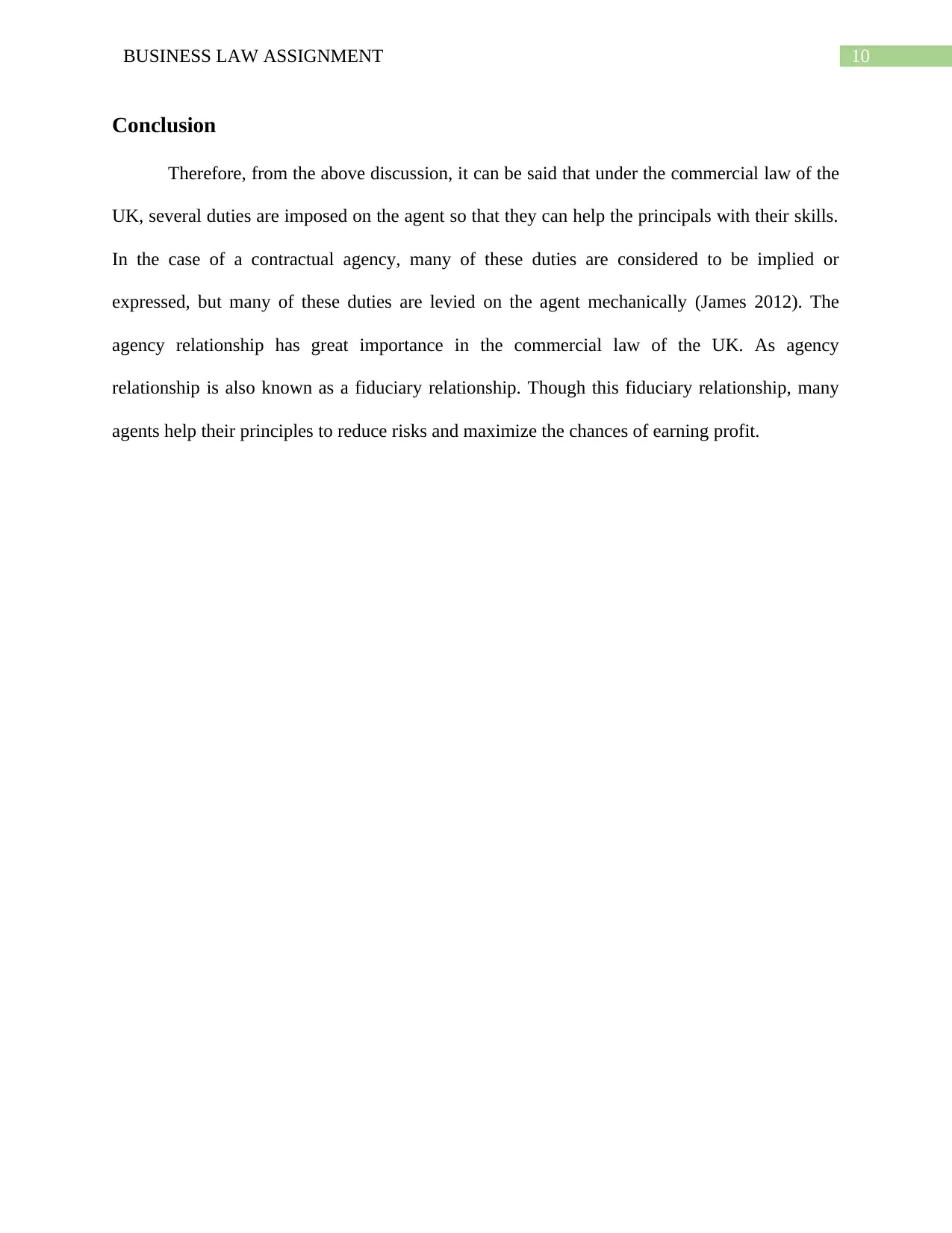
10BUSINESS LAW ASSIGNMENT
Conclusion
Therefore, from the above discussion, it can be said that under the commercial law of the
UK, several duties are imposed on the agent so that they can help the principals with their skills.
In the case of a contractual agency, many of these duties are considered to be implied or
expressed, but many of these duties are levied on the agent mechanically (James 2012). The
agency relationship has great importance in the commercial law of the UK. As agency
relationship is also known as a fiduciary relationship. Though this fiduciary relationship, many
agents help their principles to reduce risks and maximize the chances of earning profit.
Conclusion
Therefore, from the above discussion, it can be said that under the commercial law of the
UK, several duties are imposed on the agent so that they can help the principals with their skills.
In the case of a contractual agency, many of these duties are considered to be implied or
expressed, but many of these duties are levied on the agent mechanically (James 2012). The
agency relationship has great importance in the commercial law of the UK. As agency
relationship is also known as a fiduciary relationship. Though this fiduciary relationship, many
agents help their principles to reduce risks and maximize the chances of earning profit.
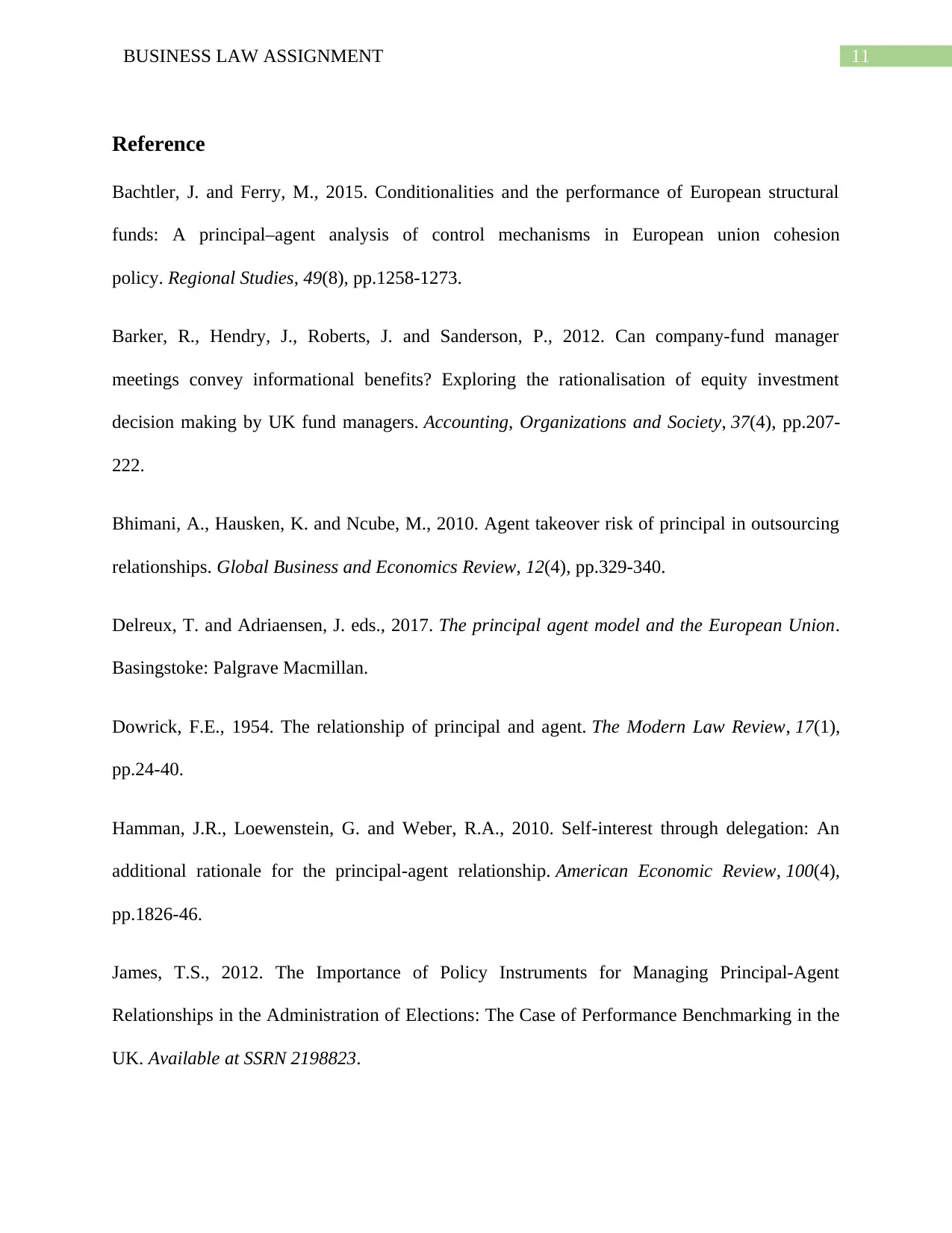
11BUSINESS LAW ASSIGNMENT
Reference
Bachtler, J. and Ferry, M., 2015. Conditionalities and the performance of European structural
funds: A principal–agent analysis of control mechanisms in European union cohesion
policy. Regional Studies, 49(8), pp.1258-1273.
Barker, R., Hendry, J., Roberts, J. and Sanderson, P., 2012. Can company-fund manager
meetings convey informational benefits? Exploring the rationalisation of equity investment
decision making by UK fund managers. Accounting, Organizations and Society, 37(4), pp.207-
222.
Bhimani, A., Hausken, K. and Ncube, M., 2010. Agent takeover risk of principal in outsourcing
relationships. Global Business and Economics Review, 12(4), pp.329-340.
Delreux, T. and Adriaensen, J. eds., 2017. The principal agent model and the European Union.
Basingstoke: Palgrave Macmillan.
Dowrick, F.E., 1954. The relationship of principal and agent. The Modern Law Review, 17(1),
pp.24-40.
Hamman, J.R., Loewenstein, G. and Weber, R.A., 2010. Self-interest through delegation: An
additional rationale for the principal-agent relationship. American Economic Review, 100(4),
pp.1826-46.
James, T.S., 2012. The Importance of Policy Instruments for Managing Principal-Agent
Relationships in the Administration of Elections: The Case of Performance Benchmarking in the
UK. Available at SSRN 2198823.
Reference
Bachtler, J. and Ferry, M., 2015. Conditionalities and the performance of European structural
funds: A principal–agent analysis of control mechanisms in European union cohesion
policy. Regional Studies, 49(8), pp.1258-1273.
Barker, R., Hendry, J., Roberts, J. and Sanderson, P., 2012. Can company-fund manager
meetings convey informational benefits? Exploring the rationalisation of equity investment
decision making by UK fund managers. Accounting, Organizations and Society, 37(4), pp.207-
222.
Bhimani, A., Hausken, K. and Ncube, M., 2010. Agent takeover risk of principal in outsourcing
relationships. Global Business and Economics Review, 12(4), pp.329-340.
Delreux, T. and Adriaensen, J. eds., 2017. The principal agent model and the European Union.
Basingstoke: Palgrave Macmillan.
Dowrick, F.E., 1954. The relationship of principal and agent. The Modern Law Review, 17(1),
pp.24-40.
Hamman, J.R., Loewenstein, G. and Weber, R.A., 2010. Self-interest through delegation: An
additional rationale for the principal-agent relationship. American Economic Review, 100(4),
pp.1826-46.
James, T.S., 2012. The Importance of Policy Instruments for Managing Principal-Agent
Relationships in the Administration of Elections: The Case of Performance Benchmarking in the
UK. Available at SSRN 2198823.
⊘ This is a preview!⊘
Do you want full access?
Subscribe today to unlock all pages.

Trusted by 1+ million students worldwide
1 out of 13
Related Documents
Your All-in-One AI-Powered Toolkit for Academic Success.
+13062052269
info@desklib.com
Available 24*7 on WhatsApp / Email
![[object Object]](/_next/static/media/star-bottom.7253800d.svg)
Unlock your academic potential
Copyright © 2020–2025 A2Z Services. All Rights Reserved. Developed and managed by ZUCOL.





